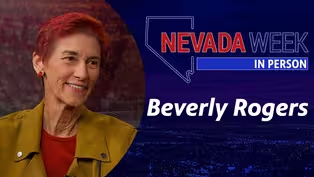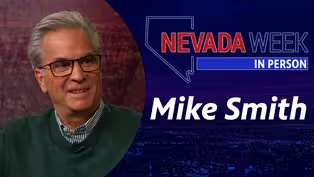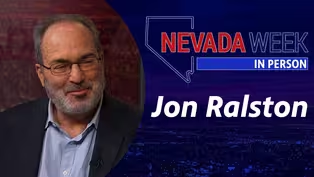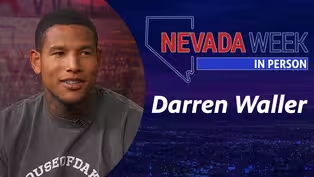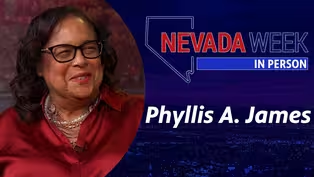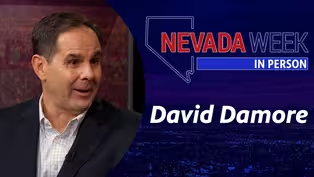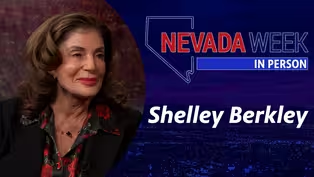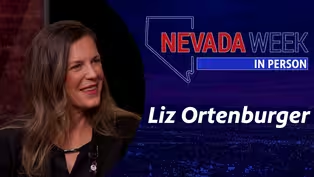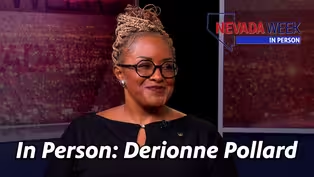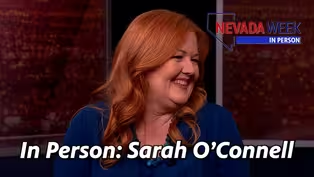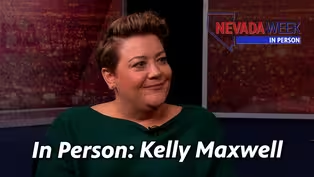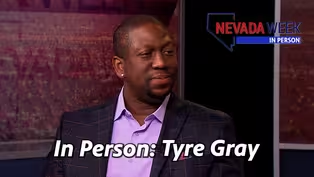
Nevada Week In Person | Steve Riback
Season 1 Episode 45 | 14mVideo has Closed Captions
One-on-one interview with Las Vegas Metro Police Lieutenant Steve Riback.
One-on-one interview with Las Vegas Metro Police Lieutenant Steve Riback.
Problems playing video? | Closed Captioning Feedback
Problems playing video? | Closed Captioning Feedback
Nevada Week In Person is a local public television program presented by Vegas PBS

Nevada Week In Person | Steve Riback
Season 1 Episode 45 | 14mVideo has Closed Captions
One-on-one interview with Las Vegas Metro Police Lieutenant Steve Riback.
Problems playing video? | Closed Captioning Feedback
How to Watch Nevada Week In Person
Nevada Week In Person is available to stream on pbs.org and the free PBS App, available on iPhone, Apple TV, Android TV, Android smartphones, Amazon Fire TV, Amazon Fire Tablet, Roku, Samsung Smart TV, and Vizio.
Providing Support for PBS.org
Learn Moreabout PBS online sponsorshipMore from This Collection
Nevada Week In Person goes beyond the roundtable discussion of Nevada Week with guests for a more casual conversation about their personal passions, new projects and compelling stories that are overlooked in the flurry of the news cycle.
Nevada Week In Person | Beverly Rogers
Video has Closed Captions
One-on-one interview with Rogers Foundation chair Beverly Rogers. (14m)
Nevada Week In Person | Mike Smith
Video has Closed Captions
One-on-one interview with Las Vegas Sun political cartoonist Mike Smith. (14m)
Nevada Week In Person | Jon Ralston
Video has Closed Captions
One-on-one interview with The Nevada Independent CEO Jon Ralston. (14m)
Nevada Week In Person | Darren Waller
Video has Closed Captions
One-on-one interview with Las Vegas Raider tight end Darren Waller. (14m)
Nevada Week In Person | Phyllis A. James
Video has Closed Captions
One-on-one interview Phyllis A. James. (14m)
Nevada Week In Person | David Damore
Video has Closed Captions
One-on-one interview with Chair of the Department of Political Science at UNLV David Damor (14m)
Nevada Week In Person | Shelley Berkley
Video has Closed Captions
One-on-one interview Senior Vice President for Touro University Shelley Berkley. (14m)
Nevada Week In Person | Liz Ortenburger
Video has Closed Captions
One-on-one interview with SafeNest CEO Liz Ortenburger. (14m)
Nevada Week In Person | DeRionne Pollard
Video has Closed Captions
One-on-one interview Nevada State College President DeRionne Pollard. (14m)
Nevada Week In Person | Sarah O’Connell
Video has Closed Captions
One-on-one interview with Director of Eat More Art LLC Sarah O’Connell. (14m)
Nevada Week In Person | Kelly Maxwell
Video has Closed Captions
One-on-one interview with Baby’s Bounty Executive Director Kelly Maxwell. (14m)
Nevada Week In Person | Tyre Gray
Video has Closed Captions
One-on-one interview with Nevada Mining Association President Tyre Gray. (14m 1s)
Providing Support for PBS.org
Learn Moreabout PBS online sponsorshipWith more than 24 years in the Las Vegas Metropolitan Police Department, Steve Riback, coauthor of My Journey Home , the true story of a police officer's fight for his right to remain Jewish, joins us this week for Nevada Week In Person.
♪♪♪ Support for Nevada Week In Person is provided by Senator William H. Hernstadt.
-Welcome to Nevada Week In Person.
I'm Amber Renee Dixon.
Known as "The Kosher Cop," Steve Riback's assignments within Metro have ranged from jail corrections to undercover vice and violent crimes.
Currently the director of Metro's Police Employee Assistance Program, Steve Riback, thank you for joining us for Nevada Week In Person.
(Steve Riback) Thank you for the honor of being here.
-We had you on recently to discuss the mental health of Metro's officers five years after 1 October, the deadliest mass shooting in modern history.
But that very morning you learned, the Police Department learned, that Officer Truong Thai, Metro Officer Truong Thai, had been shot and killed when responding to a domestic violence call.
We didn't get to talk to you about it then.
Let's talk about it now.
What's it like to get that call?
-It's, you know, as the director of the PEAP program and overseeing the Peer Support Program, that's unfortunately, that's the role that my crew of people are tasked with in terms of support for the agency.
And this was-- This was a great challenge.
It continues to be a great challenge, not only for us, but the entire department.
You know, of course, the family is grieving.
Officers are grieving.
It's got long-reaching tentacles.
I think I used that expression the other day when we, when we spoke with 1 October.
And this one does as well, especially-- Sorry, I get emotional.
I knew Thai.
I worked with him early in his career.
I knew him along the way, and just an outstanding individual.
And so his impact on the agency and a lot of officers is just greatly missed.
And true mentor.
True, true hero.
True warrior.
-What does your work look like in this area?
-So we're in the process of liaisoning with the family.
We're helping to plan all the services and the memorials and the dedications and the funeral.
That's going to happen for Officer Thai next week on Friday.
-As far as officers reaching out to your department for help, for mental health help, have you seen that?
-Yes.
We've seen it in great numbers.
Unfortunately, this is the hardest part about working in law enforcement and as a first responder.
You know, you never want to get that call that an officer is killed in the line to duty.
It's horrific, as you could imagine.
And so it's affected a lot of the officers that were there that day on the call, that are on his squad, from the crime scene workers who have to document the scene to the investigators, the detectives who have to put together the reports.
And then there's the prosecution.
And then there's the, you know, any body cam footage, any pictures that are taken, and there's a lot of trauma that continues to happen over and over.
The call takers, the dispatchers.
There's just-- There's a lot of people that were involved in it.
So there's-- There's a lot of work, a lot of work for my detail.
-How would you like Officer Thai to be remembered?
-I heard it best that he was a warrior when he went down.
And as a warrior, he was-- He was specifically on graveyard as a 20-plus year cop which is just unheard of.
You know most cops, you do as little time as possible on what we call "the yard" because then you want to get to the normal shifts, you know, either swing shift or day shift.
And Thai-- And I keep referring to him as Thai because that's-- Anybody who knew him, you didn't call him Officer Thai.
You didn't call him Truong.
It was always just Thai.
And Thai was specifically on this squad on graveyard to mentor and to be a leader to those young cops.
And it just-- It's a testament to him.
It speaks just to his character, to just how he was as a human being.
Those cops meant the world to him that he worked with.
-We're coming off a specially difficult week for police officers across the country.
According to CNN , from October 10th through 14th, 13 police officers were shot amid, quote, ...a heightened level of violence against law enforcement officers this year, end quote.
What do you believe is behind that heightened level of violence against law enforcement?
-I think, my own opinion, I think a lot has to do with, or a great deal has to do with the media.
The media and how they report.
We're having an opportunity to sit down and discuss some issues, and we have some time associated with it.
Typical news media from my vantage point is quick 30-second blurbs, or, you know, a quick link on the internet; and unfortunately, they don't get the facts.
They don't get the evidence.
My realm, my world for almost 25 years is solely fact driven.
I don't arrest people on, You know what, he said this or he might have.
You know, if it's a rumor.
We're based on facts.
And so unfortunately, I don't believe that the mainstream media has done a good job in getting the word out.
I think what that's done is that's put a misperception of police.
I would never say that we're 100% accurate in our, in how we conduct ourselves.
I'm a former lieutenant over the Internal Affairs Bureau, so I could speak from experience.
We don't always get it right.
But a very, very high majority of the time, 99% or more, we do get it right as police officers.
And I would venture to say not only in Las Vegas, but across the country, we do get it right.
And we have a few bad apples; we have people that certainly bring the profession down.
And they have no business to wear the badge.
But the media, I believe, was inaccurate in their portrayal of how police officers are, and I think that has over the course of time in the last few years, especially since the George Floyd riots, I think it's made people more brazen.
And it's emboldened people to say, Well, look, cops are-- they're vilified.
They're not the true peacekeeper.
They're not the true person who should be enforcing laws or rules.
And so they speak out and they act out, and unfortunately, it's acting out in violence.
And with that, lives are at stake.
And they're my own brothers and sisters that are perishing, unfortunately.
-What was your experience like during the local protests following the police killing of George Floyd?
-I was a newly promoted lieutenant at the time.
I'd been on a few months as a lieutenant, and I was tasked with overseeing several squads down in the downtown area.
And we were-- There was quite a large crowd there.
They were extremely violent.
They were extremely aggressive.
They were spitting on cops, throwing rocks.
They were throwing frozen water bottles at us, blocks a concrete, anything that they could damage from local businesses and the property around and use them as weapons against cops.
We were-- A lot of cops were injured.
And it was-- Certainly it was not everybody that was out there.
I mean, there were some that were, that were respectfully trying to protest.
But unfortunately, there was a great deal that were there to, to act out in violence.
And again, it came at a cost because we had an officer, a fellow cop, Shay Mikalonis, was shot that day and paralyzed as a result.
And I think it just further speaks to the violence and the difficulties that we have in law enforcement.
But again, I think it goes back to the public that gets their education from the media, and the media has that responsibility to get the facts out.
And, again, I think it speaks to their culpability.
But it is shows like this and opportunities to sit down and square away some of those facts that I think will help educate and get the word out for people.
-I want to talk more about you as a person and the title "The Kosher Cop."
Where did you get that nickname?
-It just kind of came as a nickname through the years.
I wasn't always observant.
I was born Jewish, and I've been Jewish all my life.
But as I started a couple years within the department, started to gain more religion in my life and see the higher purpose and a higher calling.
And it just kind of evolved at that point.
The nickname, it kind of stuck at that point.
-And what impact have you had as an observant Jew on the Las Vegas Metropolitan Police Department?
-I believe that it's been a great impact.
It's been something that, it was quite a challenge through the years.
Unfortunately, there was some friction early on with the Department that stemmed into a federal lawsuit, but I really wholeheartedly believe and I say that if it took all the years and all the issues that had happened prior to get to the point of where we are today with Metro, then it was, to me, it was absolutely all worth it.
And so my goals were always to be able to practice my own religion freely and within the confines of the Constitution and the law.
I felt that there was a good blend where, certainly, could be an observant practices and observant Jew and then also work as a police officer.
There was a home for that.
And evidenced by the years and years now successfully doing so on the department.
We even have-- Recently, there was a graduate in the academy who's out as a police officer now working who is a Sikh officer wearing a turban.
And I think it's incredible that we can embrace all members of the community.
We should look like our community.
We should act like our community.
We're-- You know, we taut in Metro, We're partners with our community.
And I think that it's not just words on a building or words on a sign.
We're actually carrying that out and believing in it.
-What was it that you were fighting for?
-At the time, I was just simply fighting to keep my head covered, wearing a yarmulke, which you could see today, as well as to keep a beard on my face.
And then I also wanted-- Along the way, I just wanted to make sure that there was policies in place that no other officers or employees on the Department would have to, ever have to go through what I went through.
-And those weren't allowed?
It wasn't allowed for you to cover your head or wear a beard?
-So it wasn't at the time specifically for religious reasons.
There was some different policies at the time of you could wear a hat.
We wear baseball hats in uniform.
Sometimes we wear dress caps in certain situations.
But at the time, there was no clear-cut policy for a religiously mandated yarmulke like what I was wearing.
And then beards at the time, they did allow for medical reasons, but not for religious purposes.
-All right.
Your work in action now, you spoke about how that is going.
Are there conflicts ever between being a police officer and being Jewish?
-So there-- I don't know that I would say "conflicts," although it's probably the closest word.
It's been great in terms of how the Department has been able to-- for us to work together, to work and come to some agreements.
Police work is a 24/7 type of a job.
But I am a Sabbath observer.
So I tell people I'm available 24/6 because once the Sabbath hits Friday sundown, I am unavailable.
I go off the grid, so to speak.
So no cell phone, no driving.
Being in the higher position that I'm in, I'm on call.
So I have other members within my team that we support each other.
It's no different than if I was on vacation or away.
And we're able to pick up where there's gaps.
And so there's been a couple of circumstances through the years where people know that I'm not able to pick up the phone, so they've literally come to my house and informed me of situations that have happened, to just keep me updated on it.
-I think that's a situation that a lot of people face these days, of placing boundaries between work.
-Yes.
-What would your message be?
-I mean, it's a commitment.
And it's a personal commitment.
It's something that is near and dear to me, something that I hold to a high level and a high esteem.
So each person needs to find their own-- I don't want to say their own fight, but their own what's meaningful to them.
And this is something that's very meaningful to me.
It only aids me as a police officer and makes me a better police officer.
-Steve Riback, thank you for joining us.
-My pleasure.
Thank you so much.

- News and Public Affairs

Top journalists deliver compelling original analysis of the hour's headlines.

- News and Public Affairs

FRONTLINE is investigative journalism that questions, explains and changes our world.












Support for PBS provided by:
Nevada Week In Person is a local public television program presented by Vegas PBS
